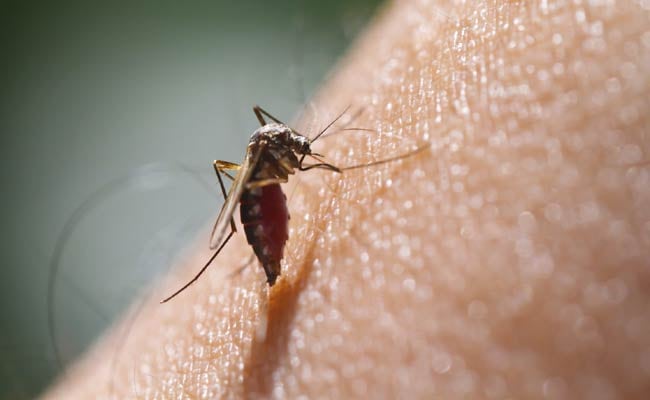
The vaccine uses a live, immature form of the malaria parasite, to stimulate an immune reaction.
Paris, France:
A malaria vaccine that mimics being bitten by an infected mosquito provided up to 100 percent protection for ten weeks in a human drug trial, its makers said Wednesday.
A newer version of the PfSPZ vaccine required fewer shots and a lower dose of live malaria parasites than previously tested, they reported in the journal Nature.
"We are extremely encouraged by these findings," said Stephen Hoffman of vaccine developer Sanaria, a company based in Maryland.
But he stressed a lot of work lay ahead, and a registered vaccine may take another two years to reach the market.
The experimental vaccine, called PfSPZ-CVac, uses a live, immature form of the malaria parasite, called a sporozoite, to stimulate an immune reaction in humans.
In a previous version of the vaccine, sporozoites were exposed to radiation to weaken them before they were injected into the bloodstream.
In that experiment, reported in 2013, trial subjects were given five shots, each with 135,000 sporozoites, or three doses with up to 1.8 million sporozoites in total.
The highest dose provided 100 percent immunity to six volunteers.
For the latest trial, volunteers received only three injections over eight weeks or 10 days at a German lab, with sporozoite doses ranging from 3,200 to 51,200 per shot.
All nine volunteers in the high-dose group enjoyed malaria protection 10 weeks after the last dose, compared to six out of nine in the medium- and three out of nine in the low-dose groups.
No radiation
"The ability to complete an immunisation regime in 10 days will facilitate the use of PfSPZ-CVac in mass vaccination programmes to eliminate the malaria parasite and to prevent malaria in travellers," Hoffman said in a statement.
The reason that fewer sporozoites were required this time, was that they were not irradiated before injection, he explained.
Instead, the vaccine was administered in conjunction with an anti-malarial drug, chloroquine, to stop the parasites causing disease once in the human body.
The candidate vaccine is being developed against the Plasmodium falciparum mosquito-borne parasite, by far the deadliest type.
Further trials are to follow in Mali, Ghana, the United States and Gabon.
According to the World Health Organization, there were 212 million malaria cases in the world in 2015 and 429,000 deaths.
More than 90 percent of deaths occur in Africa.
Another vaccine candidate called RTS,S, developed by GlaxoSmithKline, is being tested in children -- the most affected population.
It is considered the most advanced candidate, but results last year from a Kenyan trial showed it was only about four percent effective after seven years.
The developers of PfSPZ are aiming for efficiency of about 80-90 percent protection lasting six months to a year, Hoffman said. This would make it ideal for people travelling to malaria areas.
"We hope we'll be there this year, maybe next year. We're closing in on it," he told AFP.
(This story has not been edited by NDTV staff and is auto-generated from a syndicated feed.)
A newer version of the PfSPZ vaccine required fewer shots and a lower dose of live malaria parasites than previously tested, they reported in the journal Nature.
"We are extremely encouraged by these findings," said Stephen Hoffman of vaccine developer Sanaria, a company based in Maryland.
But he stressed a lot of work lay ahead, and a registered vaccine may take another two years to reach the market.
The experimental vaccine, called PfSPZ-CVac, uses a live, immature form of the malaria parasite, called a sporozoite, to stimulate an immune reaction in humans.
In a previous version of the vaccine, sporozoites were exposed to radiation to weaken them before they were injected into the bloodstream.
In that experiment, reported in 2013, trial subjects were given five shots, each with 135,000 sporozoites, or three doses with up to 1.8 million sporozoites in total.
The highest dose provided 100 percent immunity to six volunteers.
For the latest trial, volunteers received only three injections over eight weeks or 10 days at a German lab, with sporozoite doses ranging from 3,200 to 51,200 per shot.
All nine volunteers in the high-dose group enjoyed malaria protection 10 weeks after the last dose, compared to six out of nine in the medium- and three out of nine in the low-dose groups.
No radiation
"The ability to complete an immunisation regime in 10 days will facilitate the use of PfSPZ-CVac in mass vaccination programmes to eliminate the malaria parasite and to prevent malaria in travellers," Hoffman said in a statement.
The reason that fewer sporozoites were required this time, was that they were not irradiated before injection, he explained.
Instead, the vaccine was administered in conjunction with an anti-malarial drug, chloroquine, to stop the parasites causing disease once in the human body.
The candidate vaccine is being developed against the Plasmodium falciparum mosquito-borne parasite, by far the deadliest type.
Further trials are to follow in Mali, Ghana, the United States and Gabon.
According to the World Health Organization, there were 212 million malaria cases in the world in 2015 and 429,000 deaths.
More than 90 percent of deaths occur in Africa.
Another vaccine candidate called RTS,S, developed by GlaxoSmithKline, is being tested in children -- the most affected population.
It is considered the most advanced candidate, but results last year from a Kenyan trial showed it was only about four percent effective after seven years.
The developers of PfSPZ are aiming for efficiency of about 80-90 percent protection lasting six months to a year, Hoffman said. This would make it ideal for people travelling to malaria areas.
"We hope we'll be there this year, maybe next year. We're closing in on it," he told AFP.
(This story has not been edited by NDTV staff and is auto-generated from a syndicated feed.)
Track Latest News Live on NDTV.com and get news updates from India and around the world

